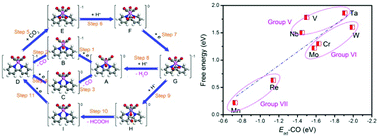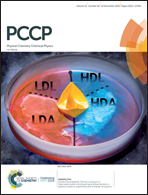Metal–bipyridine complexes as electrocatalysts for the reduction of CO2: a density functional theory study†
Abstract
Polypyridyl transition metal complexes are well-established homogeneous electrocatalysts for the reduction of CO2. In this work, the relationship between the transition metal (including V, Cr, Mn, Nb, Mo, Ta, W, and Re) and the catalytic activity has been theoretically investigated using density functional theory. It is found that the transition metal center determines the catalytic activity of M(bpy)(CO)4. Among the eight metal complexes, Re(bpy)(CO)4 and Mn(bpy)(CO)4 exhibit better catalytic activity due to the weaker adsorption strength of CO and lower d-band center, which makes it easier to activate the metal complex and results in a lower reaction free energy of the rate-determining step at the reduction potential. We believe that these results can provide guidelines for the design of novel electrocatalysts for CO2 reduction.



 Please wait while we load your content...
Please wait while we load your content...